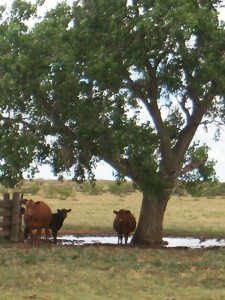**This article is not a substitute for the advice of an attorney.**
Yesterday I attended the 40th Annual Sheep and Goat Field Day in San Angelo, Texas. It was a great turn out and a great program. Welcome to the new followers who attended the Field Day.
Here’s a look at some of the ag law-related stories making news this week.
* New York’s highest appellate court will decide whether municipalities have the right to ban fracking. In New York, the regulation of oil and gas production is vested in the state, specifically in the Department of Environmental Conservation. A state law prohibits municipalities from enacting laws or ordinances “relating to the regulation of the oil, gas and solution mining industries.” More than 50 municipalities have passed laws prohibiting fracking within their bounds. (The state of New York currently has a moratorium on fracking as it investigates the potential impacts that fracking has on health and safety.) The question facing the court is whether these municipal laws banning fracking conflict with the state law prohibiting laws related to the regulation of oil and gas. Two cases related to this issue will be considered by the court. The first case was brought by an oil company and the second by a dairy farmer who argues that the municipal ban on drilling prevents her from profiting from the gas wells that were planned for her land. The lower appellate court decided that the municipal zoning ordinances banning drilling do not regulate the details or procedures of the industries, but instead merely establish permissible and prohibited uses of the land within the town. These type of municipal land use laws, according to the midlevel appellate court, are proper and permitted in New York. [Read article here.]
* The Washington Court of Appeals is set to hear arguments next week in a case involving exempt wells. Under Washington law, no groundwater may be withdrawn without obtaining a permit. An exception to this rule exists for certain types of wells. Specifically, the statute provides that “any withdrawal of public groundwater for stock-watering purposes, or for the watering of a lawn or of a commercial garden not exceeding one-half acre in area, or for single or group domestic uses in an amount not exceeding five thousand gallons a day, or…for an industrial purpose in an amount not exceeding five thousand gallons a day, is and shall be exempt from the provisions of this section.” The question before the Court of Appeals is how this statute should be interpreted. Does a person have the right to use 5,000 gallons for domestic use and 5,000 gallons for an industrial purpose, or does a person only have the right to use 5,000 total? Sixteen states, including both Texas and New Mexico, have some form of exempt well statute. [Read article here.]
* As I mentioned previously, I was able to speak at the Texas A&M Beef Cattle Short Course last month here in College Station. At the Short Course, I gave a presentation on the importance of having agricultural leases in writing. After the presentation, I was interviewed by Blair Fannin who put together an article about the importance of having grazing and bull leases in writing. [Read article here.] If anyone would like a copy of my Power Point presentation, just let me know and I will be happy to email that to you.
* A group of farmers, seed companies, and advocacy groups has filed a petition for certiorari with the Unites States Supreme Court seeking review of their case against Monsanto. The plaintiffs filed suit in March 2011 seeking to prohibit Monsanto from suing them if their fields became contaminated with Monsanto’s genetically patented traits for cotton, corn, soybeans, canola, and other crops. Since it developed the patented crops, Monsanto has sued over 100 farmers for use of Monsanto’s’ seed without paying the required royalties to do so. Nevertheless, Monsanto has said it will not sue farmers who do not intentionally use the seed without paying. Based upon this, the lower courts found no controversy and dismissed the case. The Supreme Court will now determine whether to accept the case. Only about 3.7% of certiorari petitions are granted each year by the United States Supreme Court. [Read article here.]
* Todd Janzen, an agricultural attorney in Indiana, posted an interesting blog this week discussing whether the government can use drones to monitor agricultural production on private property. [Read post here.]












